Navigate through biblical narratives to uncover the profound complexities of brotherhood, from betrayal and envy to forgiveness and unconditional love.
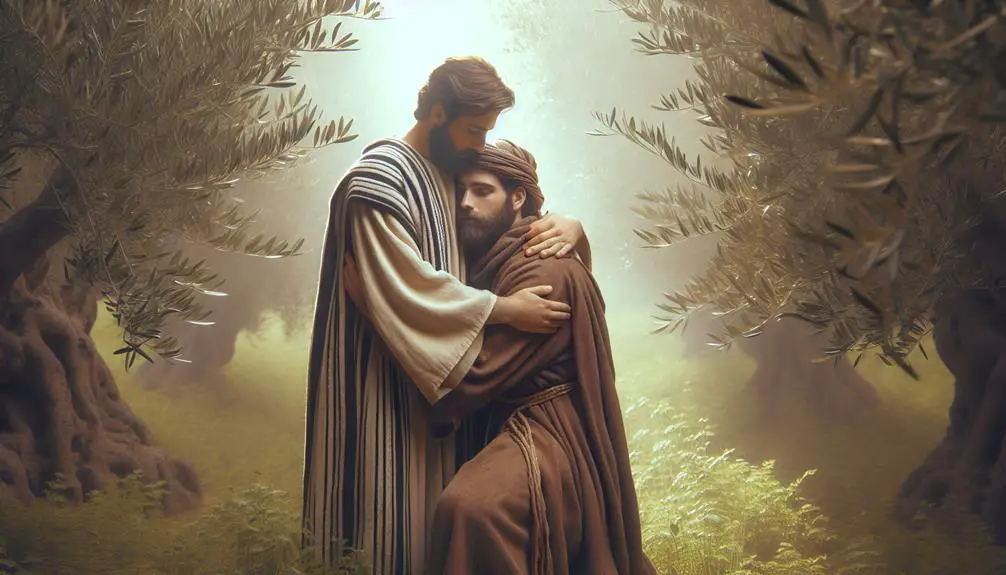
Brother in the Bible
In the tapestry of biblical narratives, the thread of brotherhood weaves through both harmony and discord, illustrating the complex nature of these relationships. You'll find stories like Cain and Abel's, where envy leads to the ultimate betrayal, and Joseph's, where forgiveness reunites a family torn apart by jealousy.
The bond between Moses and Aaron showcases leadership intertwined with steadfast support, whereas David and Jonathan's friendship transcends blood ties, embodying a profound connection. The parable of the Prodigal Son teaches about unconditional love and redemption.
Each story offers a unique lens through which to explore the multifaceted roles brothers play, inviting you to uncover the deeper meanings hidden within these ancient texts.
Key Takeaways
- Biblical narratives often use brotherhood to explore themes of envy, betrayal, and reconciliation.
- Relationships like David and Jonathan's show that spiritual kinship can transcend blood ties, emphasizing loyalty and mutual respect.
- Stories such as The Prodigal Son highlight the importance of forgiveness, redemption, and unconditional love within familial bonds.
- Leadership dynamics between figures like Moses and Aaron illustrate how cooperation and support are critical in fulfilling divine purposes.
Cain and Abel: Fraternal Envy
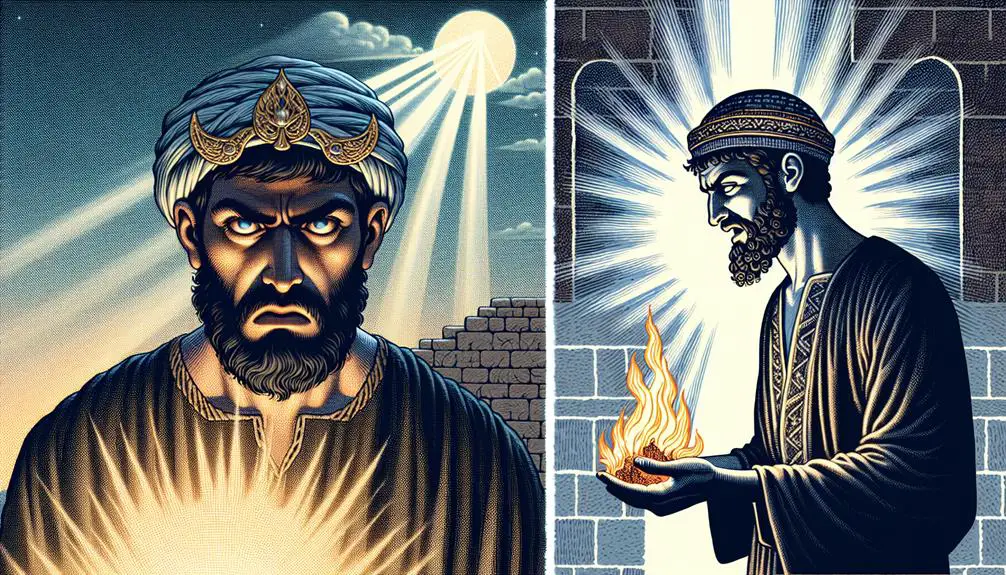
The story of Cain and Abel exemplifies the destructive power of fraternal envy, setting a precedent for sibling rivalry in biblical narratives. You're delving into a tale that not only portrays the first murder in human history but also serves as an allegory for the moral downfall that can arise from unchecked jealousy and competition between siblings. This account, found in the Book of Genesis, underscores how sibling rivalry transcends mere familial disputes, evolving into a profound theme of moral instruction and spiritual warning.
Cain's inability to rejoice in his brother Abel's success, instead perceiving it as a personal slight, illustrates a critical lesson. You observe that the heart of sibling rivalry often lies not in the success or failure of the individuals involved but in the perception and comparison of these outcomes. Cain's subsequent murder of Abel, driven by envy, marks a pivotal moment of moral downfall, highlighting how the corrosive nature of jealousy can lead not only to personal ruin but also to the fracturing of familial bonds.
This narrative encourages you to reflect on the broader implications of sibling rivalry, suggesting that such conflicts, when left unresolved, have the potential to result in irreversible consequences. It's a cautionary tale reminding you that the seeds of envy, if allowed to take root, can devastate relationships and lead to moral decay. Thus, the story of Cain and Abel serves as a foundational discourse on the dangers of sibling rivalry, offering timeless insights into the human condition and the perils of allowing envy to dictate one's actions.
Joseph's Journey: Betrayal to Reunion

While exploring the profound impacts of sibling rivalry within biblical narratives, we encounter Joseph's journey, a story that intricately weaves themes of betrayal and reconciliation among brothers. Joseph's tale starts with dream interpretation, a skill that both elevates and isolates him. His ability to decode the celestial messages not only forecasts his own ascent but also foretells the dire consequences for his brothers, fueling their envy and leading to his eventual betrayal.
You see, Joseph's brothers, driven by jealousy and fear of his favored status, conspire against him, selling him into slavery. This act of betrayal marks the beginning of Joseph's tumultuous path from the depths of a dungeon to the heights of Egyptian power. His gift for interpretation plays a pivotal role in this ascension, particularly when he accurately predicts the onset of Egypt's famine through Pharaoh's dreams. This famine, a critical event, becomes the catalyst for the brothers' eventual reunion, though they're unaware of Joseph's identity when they first seek aid in Egypt.
Joseph's story is a masterclass in patience and forgiveness. Despite the gravity of their betrayal, he chooses to reconcile with his brothers. This decision isn't made lightly; it's a culmination of his growth and understanding of his destiny. Joseph recognizes that his suffering and subsequent rise to power were necessary for the survival of his family and many others during Egypt's famine.
The narrative doesn't just highlight personal redemption but also underscores the significance of dream interpretation within biblical texts, revealing how divine messages can guide one's fate and foster reconciliation in the face of overwhelming odds.
Moses and Aaron: Leadership and Support

You'll observe that within the narrative of Moses and Aaron, their roles exemplify a dynamic interplay of leadership and support crucial for their mission's success.
Moses' journey as a leader is marked by challenges that are mitigated by Aaron's unwavering support, highlighting the indispensable role of a supportive figure in the face of adversity.
This relationship not only enriches our understanding of biblical leadership but also offers insights into the complexities of brotherhood and collaborative success.
Aaron's Supportive Role
Aaron's role as Moses' brother and supporter exemplifies a pivotal partnership in biblical leadership dynamics, illustrating how complementary skills and shared faith can achieve divine purposes. As you delve into their story, notice how Aaron's contributions, such as wearing priestly garments and intervening during plagues, are critical in the narrative.
Aspect |
Description |
|---|---|
Priestly Garments |
Symbolizes Aaron's spiritual and leadership role. |
Plague Intervention |
Demonstrates Aaron's active involvement in miracles. |
Support for Moses |
Provides the necessary backing for Moses' mission. |
Shared Faith |
Unifies them towards a common divine goal. |
Their partnership is not merely a fraternal bond but a strategic alliance that furthers their mission. Aaron's supportive role is indispensable, showcasing how leadership and support go hand in hand in fulfilling one's purpose.
Moses' Leadership Journey
Moses' leadership journey, marked by trials and triumphs, unfolds as a testament to the power of divine guidance and brotherly support. The burning bush serves as the pivotal moment, a divine encounter that propels him into a leadership role, albeit reluctantly. This episode not only signifies his call but also epitomizes the complexity of his mission.
The subsequent plague confrontations with Pharaoh underscore Moses' evolving leadership, showcasing his resilience, strategic acumen, and reliance on divine support. Throughout these challenges, Aaron's unwavering support is crucial. He acts not just as a spokesperson but as a pillar of strength, underscoring the indispensable role of brotherly support in confronting tyranny and leading a community towards liberation.
This dynamic between Moses and Aaron illuminates the multifaceted nature of effective leadership.
David and Jonathan: Beyond Blood Ties
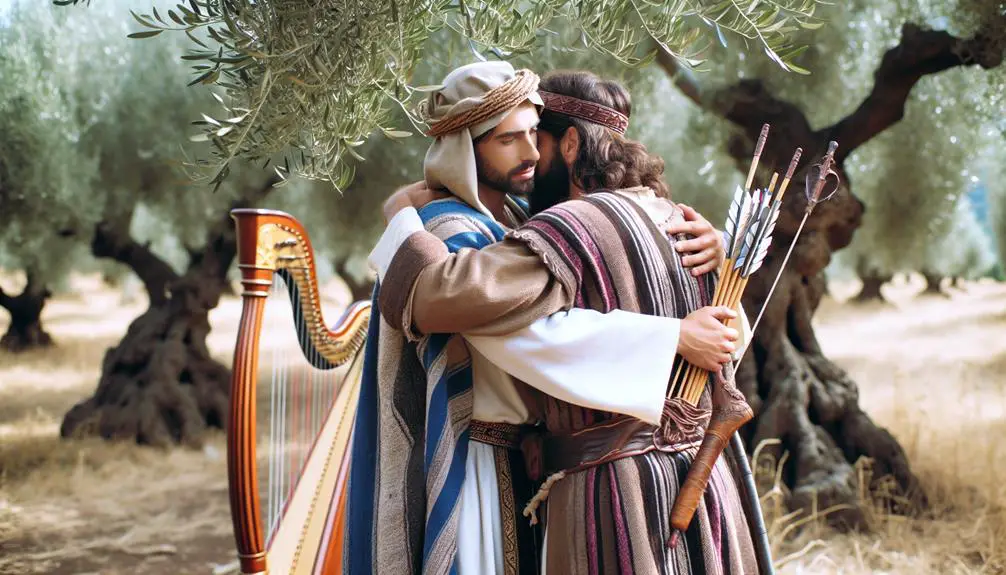
The relationship between David and Jonathan in the Bible transcends conventional blood ties, exemplifying a profound bond rooted in loyalty, respect, and mutual affection. This unique alliance is further solidified through a friendship covenant, showcasing a commitment that surpasses mere political or familial obligations. Analyzing this relationship offers insights into the complexities of human connections, especially within the context of ancient narratives that often prioritize kinship and war alliances.
The friendship covenant between David and Jonathan is a pivotal moment, underscoring the depth of their relationship. Unlike typical war alliances formed for strategic advantage, their bond isn't predicated on mutual enemies or political gain. Instead, it's a heartfelt commitment to each other's well-being, transcending the tumultuous landscape of war and power struggles that characterized their era. This covenant represents a mutual understanding and a promise of loyalty, setting a precedent for friendships that value personal connection over societal expectation.
Moreover, their alliance during times of war isn't merely a strategic maneuver but a testament to their unwavering support for one another, challenging the prevailing norms of their time. Jonathan's willingness to defy his father, King Saul, in support of David, despite the potential threat to his claim to the throne, exemplifies the sacrificial nature of their bond. It's a narrative that invites reflection on the essence of friendship and loyalty, suggesting that true alliances are built on shared values and mutual respect.
In analyzing David and Jonathan's relationship, it's evident that their connection goes beyond blood ties, offering a narrative rich in lessons about the power of friendship, the significance of covenants, and the enduring nature of true loyalty.
The Prodigal Son: Forgiveness Embodied

Shifting our focus to another profound biblical narrative, we encounter the story of the Prodigal Son, a parable that epitomizes the essence of forgiveness and reconciliation. This tale, nestled within the Gospel of Luke, unfolds the journey of a younger son who demands his share of the inheritance from his father, leading to an inheritance division that disrupts familial harmony. You observe the son squandering his wealth in a distant country, a decision that plunges him into destitution.
Upon his return, expecting disdain, the son finds instead an unwavering embrace from his father, who initiates a celebration in his honor. This act of unconditional forgiveness illustrates the boundless grace available to those who seek repentance. However, the celebration controversy emerges starkly when the elder son, who stayed behind to tend to the family estate, voices his indignation. He perceives his loyalty as overlooked, questioning the fairness of the lavish welcome accorded to his wayward brother.
Analyzing this narrative, you're prompted to reflect on the complexities of human emotion and the profound capacity for forgiveness. The father's response serves as an allegorical depiction of divine forgiveness, highlighting the disparity between human and divine perspectives on justice and mercy.
The Prodigal Son story, therefore, not only addresses the personal reconciliation between family members but also delves into the broader theme of redemption. It challenges you to consider the depth of forgiveness you're willing to extend and the unconditional love that underpins true reconciliation, offering a timeless reflection on the power of grace and the essence of familial bonds.
Spiritual Brotherhood in Christ's Teachings
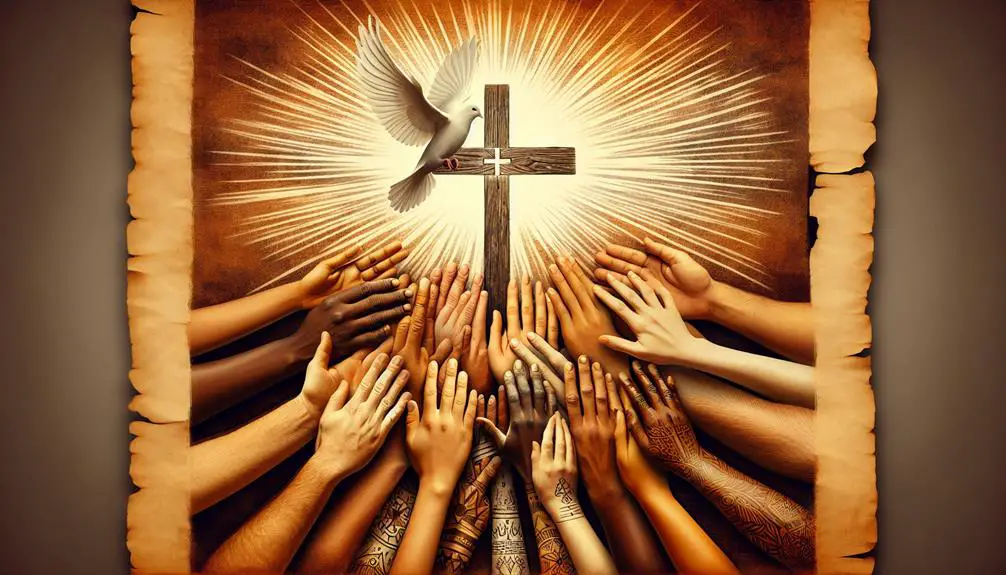
In Christ's teachings, a profound emphasis is placed on the concept of spiritual brotherhood, challenging believers to reevaluate their relationships within the framework of divine kinship. This notion transcends traditional familial bonds, urging you to see each other as siblings under the parentage of God. Here, the principle of unity in diversity becomes paramount. Christ's message doesn't erase individual differences; instead, it calls for harmony amidst diversity, encouraging you to embrace and celebrate the unique contributions each brings to the collective faith journey.
Central to spiritual brotherhood in Christ's teachings is the concept of love's sacrifice. You're instructed to love your neighbor as yourself, a directive that elevates the welfare of others to the level of one's own. This sacrificial love is the cornerstone of spiritual brotherhood, embodying the ultimate expression of divine love that Christ himself demonstrated on the cross. It's a love that doesn't count costs, that lays down one's life for friends, and in doing so, reflects the very heart of God.
This brotherhood, therefore, isn't merely a social or moral expectation; it's a sacred calling that you're invited to participate in. It demands a radical reimagining of community and personal relationships, rooted in the recognition of each other as fellow heirs to the Kingdom of God. As you navigate this path, you're not just building a community; you're actualizing the Kingdom of God on earth, a kingdom where love, unity, and diversity converge in the beautiful mosaic of spiritual brotherhood.
Frequently Asked Questions
How Does the Concept of Fraternity in the Bible Relate to Modern Fraternal Organizations and Their Principles?
You're exploring how biblical fraternity principles relate to modern fraternal organizations. These ancient concepts often mirror the foundations of today's groups, emphasizing brotherhood, moral integrity, and mutual support.
Fraternal symbols rooted in biblical narratives find modern parallels, illustrating continuity in values. Analyzing these connections, you'll find that the core ideals of ancient brotherhoods have seamlessly woven into the fabric of contemporary fraternal organizations, maintaining a scholarly and contextual approach to understanding their evolution.
In What Ways Does the Bible Address the Resolution of Conflicts Between Brothers Outside the Stories Mentioned?
You'll find that the Bible offers deep insights into resolving conflicts, emphasizing forgiveness rituals and reconciliation strategies. These teachings encourage you to look beyond personal grievances, advocating for patience, understanding, and the seeking of mutual ground.
Such approaches aren't just ancient texts but are incredibly relevant today, guiding you to mend relationships thoughtfully. They underscore the importance of communication and empathy, pivotal in overcoming disagreements and fostering lasting peace.
Are There Examples of Brotherhood Among Women or Sisterhood in the Bible That Parallel the Depth of the Relationships Explored in These Stories?
In the tapestry of biblical narratives, sisterly bonds and feminine unity shine as threads of strength and resilience. You'll find that sisterhood parallels the profound relationships among men with stories like Ruth and Naomi or Mary and Elizabeth.
These examples not only highlight the depth of female relationships but also underscore the importance of mutual support and loyalty. Analyzing these narratives, it's clear that the Bible celebrates the power of sisterhood.
How Have Different Cultures and Religions Interpreted the Biblical Narratives of Brotherhood, and What Impact Does This Have on Interfaith Relationships?
You'll find that cultures and religions have varied genealogical interpretations of biblical narratives, deeply influencing interfaith dialogues. This diversity in understanding can sometimes challenge, but also enrich, interfaith relationships.
How Do Biblical Teachings on Brotherhood Influence Contemporary Discussions and Policies on Social Justice and Equity?
Imagine a world where equality principles and social responsibility aren't just ideals, but realities. Biblical teachings on brotherhood have seeped into contemporary discussions, shaping policies on social justice and equity.
They urge you to look beyond mere compliance, to embrace a deeper understanding of fairness and compassion. This influence isn't overt, yet it nudges societies towards more inclusive practices, embedding a sense of collective duty in the quest for a just world.
Conclusion
In sum, the Bible's narratives on brotherhood, from Cain and Abel's tragic rivalry to the spiritual kinship preached by Christ, underscore the complexity and depth of fraternal relationships. These stories not only reflect ancient societal norms but also offer timeless insights into human nature.
Consider, for example, a modern context where two siblings, embroiled in a legal dispute over inheritance, ultimately find reconciliation, mirroring the Prodigal Son's tale. This illustrates the enduring relevance of biblical lessons on forgiveness and familial bonds.

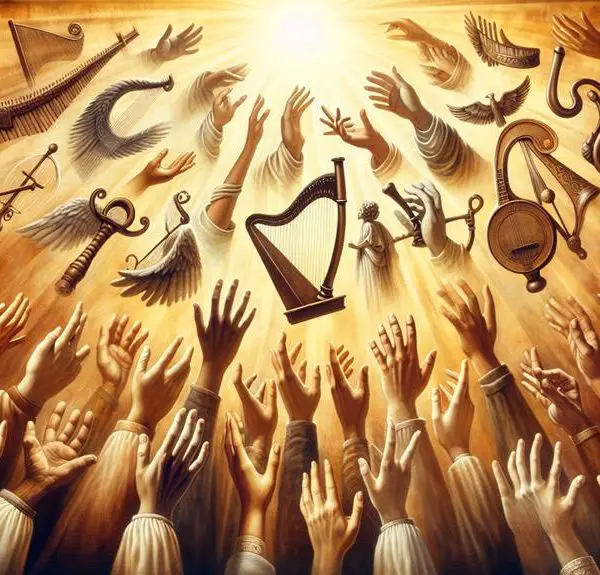
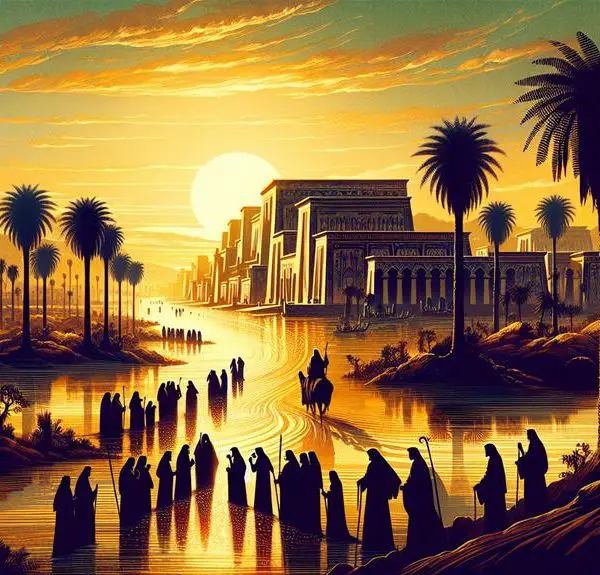
Sign up